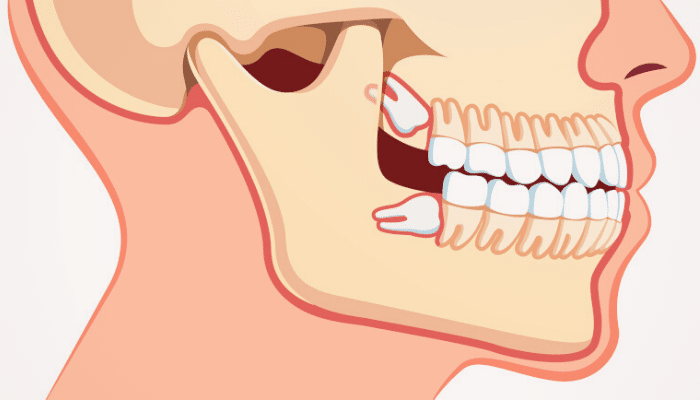As a dentist, in my practice, I have seen most patients suffering from wisdom teeth problems and also a lot of confusion about whether to get them removed or not. So, I decided to give it some clarity. I understand how essential it is to maintain good oral health and to address any issues that could affect the health of your teeth and gums. One such concern often arises is the presence of wisdom teeth and the potential need for removal.
What is a Wisdom Tooth?
Wisdom teeth, also known as third molars located at the back of your mouth, typically erupt during the late teens or early twenties (ages 17 – 25 years). While these teeth can be valuable assets when they grow correctly, they often pose problems when there isn’t enough space in the mouth for them to fully emerge or develop correctly. In such cases, tooth removal may be necessary to prevent dental issues. Like any other Tooth Extraction, a dentist or an Oral and Maxillofacial Surgeon (Dentist specializing in Oral Surgery) can do Wisdom Tooth extraction.

In this article, we will find out why dentists may suggest the removal of wisdom teeth. By understanding these reasons, You can make choices about your oral health and take measures to keep your teeth healthy and aligned. Let’s discuss why removing wisdom teeth is essential and how it can improve your overall well-being.
Reasons for Wisdom Tooth Removal
There are several reasons why you need to get your wisdom teeth removed. Some of them are as follows.

1. Impaction
When a wisdom tooth doesn’t have enough room to emerge properly, it becomes impacted. This can lead to pain, swelling, and discomfort. Additionally, impacted wisdom teeth can damage adjacent healthy teeth and cause issues with biting and chewing. The impacted wisdom tooth needs to be removed for better oral health.
2. Misalignment
Wisdom teeth often erupt at angles other than normal, pushing against nearby teeth and disturbing the alignment of the dental arch. This misalignment can lead to crooked teeth, overcrowding, and difficulties in maintaining proper oral hygiene.
3. Decay and infection
Because wisdom teeth are located at the back of the mouth, they can be hard to clean effectively. As a result, they are more prone to decay and infection. Wisdom tooth decay can cause severe pain and discomfort. Removing them can prevent cavities, gingival disease, and the need for future dental treatments.
4. Gum disease
Impacted wisdom teeth create pockets where bacteria can accumulate, leading to gum disease. This can cause inflammation, bleeding of the gums, and, eventually, tooth loss if left untreated. Removing them can help prevent the progression of this disease and maintain gum health.
5. Cysts and tumors
In rare cases, wisdom teeth can develop cysts or tumors, which can damage the jawbone and surrounding teeth. These growths may require surgical removal and can cause significant pain and discomfort if left untreated.
6. Crowding
The eruption of wisdom teeth can cause overcrowding in the mouth, leading to tooth shifting and potential orthodontic problems. This can result in crooked teeth, bite issues, and difficulties with proper oral hygiene.
7. Pain and discomfort
Impacted wisdom teeth can cause severe pain and discomfort, particularly when infected or inflamed. This pain may radiate to the jaw, ear, or head, making eating, speaking, or sleeping difficult. Removing such wisdom teeth can alleviate this pain and improve oral health and quality of life.
8. Sinus Problems
Impacted wisdom teeth in the upper jaw can sometimes cause pressure on the sinuses, leading to symptoms such as sinus pain, pressure, congestion, or even sinus infections. Sometimes, this pressure can worsen existing sinus issues or symptoms of sinus problems.
9. Preventive Measure
Dentists recommend removing wisdom teeth as a preventive measure in certain cases, especially when there are indications that wisdom teeth may cause problems in the future. Ultimately, deciding whether to remove wisdom teeth as a preventive measure should be made in consultation with a dentist.
Conclusion: Wisdom tooth removal for better dental health.
In conclusion, wisdom tooth removal is a thoughtful approach to maintaining optimal oral health and preventing potential complications. You can avoid unnecessary pain, discomfort, and more extensive dental treatments by dealing with issues like impaction, misalignment, decay, infection, and gum disease early. Talking to your dentist or oral surgeon about whether removing wisdom teeth is right for you is essential. Using an x-ray, your dentist will confirm the position and growth of your wisdom teeth to determine if extraction is necessary.
You can always book my appointment if you still have any questions or queries from here.
Frequently Asked Questions
Wisdom teeth often need to be removed because they can become impacted, causing pain, infection, and damage to surrounding teeth. They may also lead to overcrowding or misalignment of the teeth.
Wisdom teeth are typically removed during the late teens or early twenties before they fully develop and cause complications. However, the timing may vary depending on individual factors such as the position of the teeth and the presence of symptoms.
The procedure itself is performed under local or general anesthesia so that you won’t feel any pain during the surgery. However, some discomfort and swelling may occur during the recovery period. Pain medication and proper care can help manage any discomfort.
While wisdom tooth removal is generally safe, some risks are associated with the procedure, including infection, bleeding, dry socket, and damage to nearby teeth or nerves. These risks can be minimized by carefully choosing an experienced oral surgeon and following post-operative instructions.
In some cases, wisdom teeth may not need to be removed if they are healthy, fully erupted, and properly aligned. Other alternatives may include Root Canal Treatment if there is proper access, orthodontic treatment to accommodate wisdom teeth or conservative management of symptoms.
